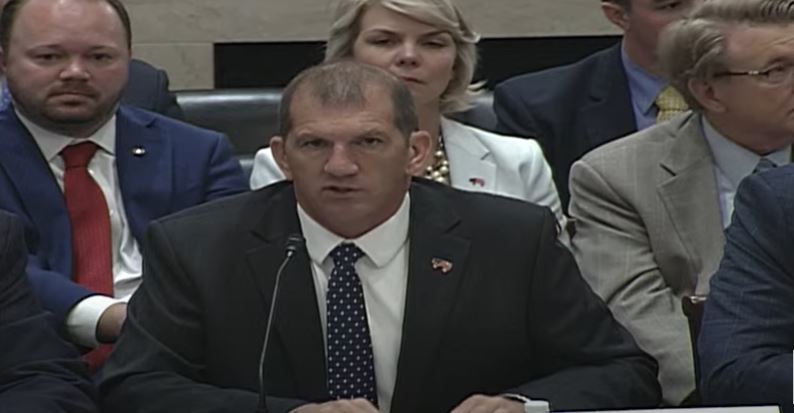During subcommittee hearing Prop 12 concerns raised, from pig pen today to barnyard tomorrow in more states.

U.S. pork producers are losing on average $40 per head on hogs marketed so far in 2023. Those losses are largely due to record high production costs that have increased 50% from 2020, said Scott Hays.
"This is putting a pinch on the pork industry and could drive consolidation at the farm level as producers may be forced to exit the industry due to this economic reality," said Hays, who serves as president of the National Pork Producers Council. "On top of this, the Supreme Court released a disappointing decision on California's Prop 12 last week. The implications of that decision will go far beyond the farm."
During the House Agriculture Committee's Subcommittee on Livestock, Dairy, and Poultry hearing "A Review of Animal Agriculture Stakeholder Priorities," Hays testified on behalf of the more than 60,000 pork producers nationwide. He said NPPC stands behind the rights of farmers and consumers across this country as Congress drafts the next farm bill, but Congress needs to consider the needs and economic conditions of today, as well as the growing threat of foreign animal disease.
"The three-legged stool of animal health that was laid out in the 2018 Farm Bill has set the course for what pork producers need in the upcoming farm bill," Hays said. "An outbreak of foreign animal disease would devastate not just hog farmers, but also cattle, sheep and feed grain producers, and result in the loss of thousands of jobs through disruptions and domestic production and the loss of export markets."
NPPC called for a one-year extension of Livestock Mandatory Price Reporting as the industry gathers input from producers in advance of a full reauthorization. The pork producers also oppose the proposed changes under the Packers and Stockyards Act.
"While NPPC believes that we can make meaningful changes to price reporting, that we give producers greater transparency in marketing their livestock, we are also concerned about current efforts that would stifle innovation, reduce competition and introduce significant legal and regulatory uncertainty," Hays said. "For these reasons NPPC opposes the changes proposed under the Packers in Stockyards Act and asks that USDA work in the industry to find meaningful reforms that provide greater transparency for pork producers."
Expanding U.S. pork exports and access to foreign markets is another top priority for NPPC. Increased funding for the Market Access Program and the Foreign Market Development Program through the farm bill are critical to building commercial export markets for U.S. agricultural products.
"The value of pork exports equals $61 per every hog marketed," Hays said. "NPPC is therefore a strong advocate for increasing funding for these programs through the farm bill."
Finally, Hays addressed the ongoing labor shortage, which is not only impacting the agricultural sector but also threatening the food supply.
"Labor on pig farms is year-round, so we need a visa program that provides year-round labor and the rural areas, where pig farms are at, unemployment is at 3% or less. Coupled with that is an aging population and shrinking family size," Hays said. "The labor's just not available. We pay very competitive wages. We provide good benefits, but the people just aren't there, so we need a visa program that works for our industry the way it works. And reform to the H2-A program seems to be a common-sense approach to fixing that."
Prop 12 discussion
Hays along with Bryan Burns, vice president and associate general counsel for the North American Meat Institute, were both hit with several questions regarding the recent Prop 12 decision.
Congressman Randy Feenstra (IA-04) said coming from the No. 1 hog-producing area in the country, Prop 12 "is a direct attack on our producers."
"Our producers treat our animals very well. They really do. I watch it every day," Feenstra said. "So, this rule, really to me, is very counterintuitive. The ruling to me opens the floodgates for a lot more laws coming down the pipe. I mean, what's next? What does New York want to do? What does Illinois want to do? All of a sudden you have these different rulings from different states, and now all of a sudden the producers, the breadbasket to the world, has to follow each and every state."
Hays stated the pork industry also shares in those concerns about the unknown implications from Prop 12, but for right now the focus is on protecting consumers in California.
"We're trying to ensure that they have product, even though it's going to cost them a lot more for the same product, and we're trying to protect producers' freedom to operate, but we do have concerns moving forward," Hays says. "It's not about the pork industry, it's about everyone who produces something. And then it's also about being able to comply with so many different rules. I mean, I guess in theory, we could have 50 different markets in this country, if each state adopts its own rules, and that would just be devastating to every industry."
Representative Derrick Van Orden (WI-03) called Prop 12 "an absurd proposition" and asked Burns for an estimate as to the monetary impact it will have on the meat processing industry.
Burns said while they are still working on assessing the financial consequences of Prop 12, it's going to be "very significant."
"I would echo the concerns raised by our producer community, and also I think, Chairman Mann captured the concern really well in the agriculture community a few days ago when he said, 'today it's the pig pen and tomorrow it's the whole barnyard,'" Burns said. "Yeah, we need to be concerned not just about the financial impact on the pork industry, but also other species and in fact other manufacturing enterprises."
About the Author(s)
You May Also Like





